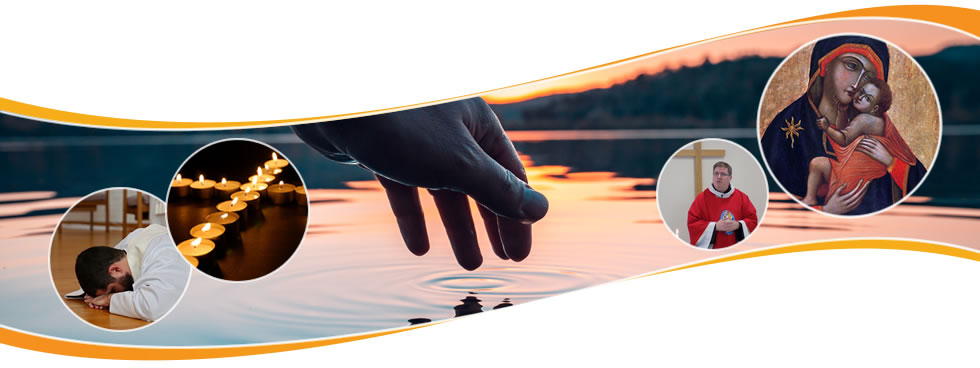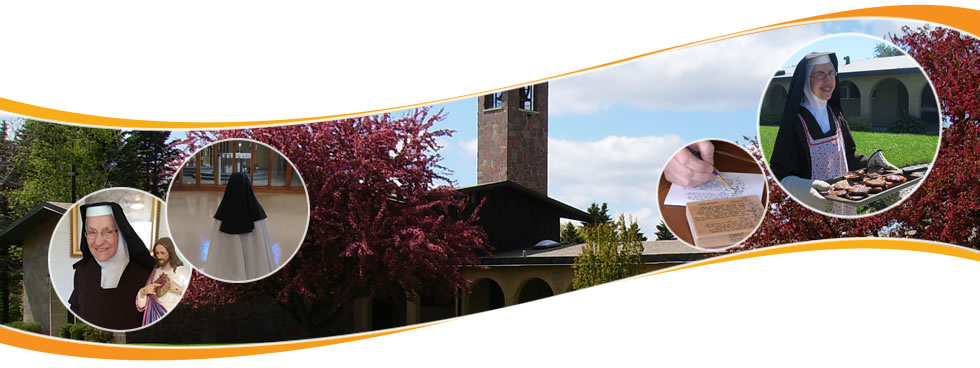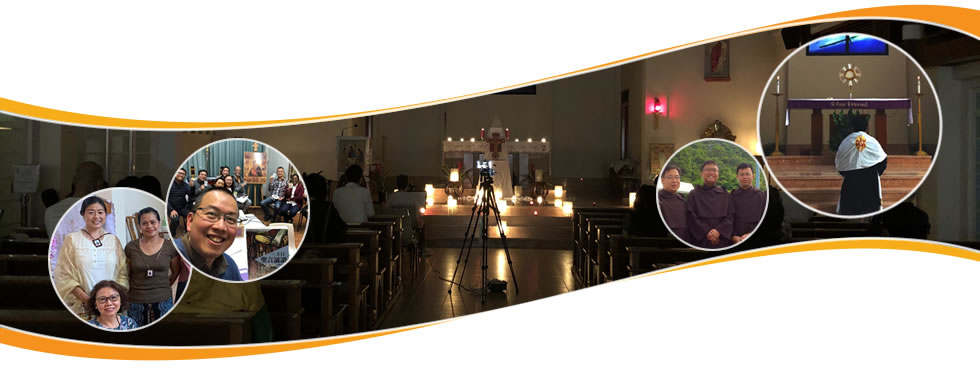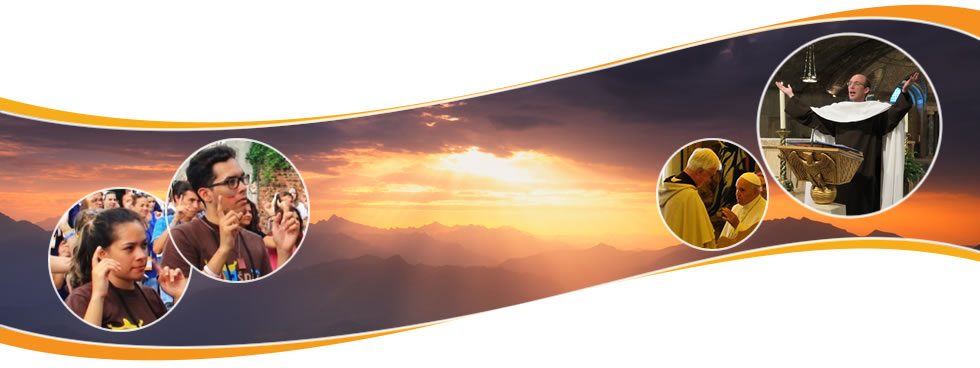Joseph Chalmers, O.Carm.
Throughout the centuries various ways of following Christ have been tried and tested. Some of these ways have endured to our present day and still have the power to attract many people and help them to live a deeper life of allegiance to Jesus Christ. One of these ways is the Carmelite way.
A vocation is a very personal call from God. Each of us has our own particular vocation to become what God knows we can be. An important part of our vocation is our attraction to a particular way of following Christ. Some people are attracted to the Jesuit, or Franciscan or Dominican way but we feel deep within us an attraction to the Carmelite way. No particular spirituality is better than another. They all are intended to help us live the Gospel in the fullest possible way. Our way is the Carmelite way because that is the path to which God has called us.
So what is this Carmelite way? First of all, as with every Christian spirituality, we are called to be followers of Christ. We keep our eyes fixed on him; he is our leader, our teacher, our brother, our saviour, our Lord. We seek to assimilate his message and to live the Gospel in daily life. The Carmelite way of doing this is to commit ourselves to search for the face of the Living God, which is the contemplative dimension of life, to fraternity and to the service of others. These values are intimately related to one another and are united by means of the experience of the desert. Like Elijah, we must pass by way of the desert in order to reach Mount Horeb, the mountain of God. In the desert, the living flame of love burns within us, burning away all that is not God, and preparing us to meet God in the sound of a gentle breeze. We are not alone on this journey. Accompanying us always is Our Lady, our sister and our mother, who gently teaches us how to listen to the still small voice of God and to consent to God's presence and action in our life. Carmel has always been marian and will always be so. We express our devotion to Our Lady in different ways according to our different cultures but all of us seek to live our devotion by becoming like her.
The first hermits on Mount Carmel gathered as a community in order to seek God's will together. Somewhere between 1206 and 1214 these hermits had reached such a unity and common purpose that they decided to make their group more formal by seeking ecclesiastical approval and so they asked Albert, Patriarch of Jerusalem, to write for them a "formula vitae" based on the proposal which they presented to him.
In 1997 we celebrated the 750th anniversary of the definitive approval of the Rule. On this occasion, the Superior General of the Discalced Carmelites and I sent a joint letter to the whole Carmelite Family about the Rule which has been and remains the inspiration for the two Orders. It is not only an historical document but is a real source of inspiration for all Carmelites. The title of our letter was, "Open to God's Future". Our spiritual tradition is not only a great treasure of the past but has the power to inspire us today and in the future.
The Carmelite Rule is brief and we do not possess a copy of the original, written between 1206 and 1214. The oldest version which exists is that definitively approved by Pope Innocent IV in 1247 when the hermits desired to join that new prophetic movement in the Church at the time - the mendicant movement.
There are various ways of reading a text. We can ask what St. Albert meant and what the hermits understood when he wrote. There are also other possible interpretations which go beyond what St. Albert and the hermits actually had in mind. These new interpretations come about by asking the text the questions we have, based on our own experience of life. An ancient text like the Rule can also be studied in a scientific or historical way. All of these different studies and methods of interpretation are important but even more important of course is to live the values contained in the Rule.
It is possible to interpret a text but not allow it to touch us deeply. One can approach a text with the conviction that one already knows very well what it has to say. In this case one runs the risk of not being open to the nuances of the text. The same problem exists when we approach Sacred Scripture. At times familiarity with the words of Jesus can actually be a barrier to what God wants to say to us today which is a word of salvation.
The Rule is imbued with the Word of God. Even though it is brief, it contains about 100 Scriptural allusions either explicit or implicit. St. Albert clearly was a man who had meditated at length on the Word of God. The hermits were commanded to meditate on the law of the Lord day and night. The reason for this precept is directed towards the transformation of the individual in Christ. It is important to seek with the intellect what the Word means but even more important is that the Word itself is on our lips and in our hearts and accompanies our every action (Rule, 19).
At the beginning of the Rule, St. Albert says that everyone is called to live in the "obsequium Iesu Christi". Studies on the Rule have shown that it is not a simple list of regulations; in fact, comparing the sketch of the Christian community present in the Acts of the Apostles with the Rule, one notes many points of convergence and a similar logical structure. In Acts we find the following:-
"They devoted themselves to the apostles' teaching and fellowship, to the breaking of bread and the prayers…….And all who believed were together and had all things in common….." (2, 42-47) and "Now the company of those who believed were of one heart and soul, and no-one said that any of the things which he possessed was his own, but they had everything in common." (4,32).
The hermits came from various parts of Europe to live in the land made sacred by the presence of Jesus and where he shed his blood for the redemption of the human race. Jesus Christ is at the centre of the Rule and of the life of each hermit. They desired to form a community of disciples, taking as their model the primitive Christian community. In order to accomplish this project, each individual must allow the law of God to take full possession of his heart. To stay awake in prayer is an essential attitude (Rule, 10) in order to be always ready for the Lord's coming to us. A community can be compared to an orchestra. Each instrument must be in harmony with all the others so that the whole orchestra can play the same tune. Analogously in our communities, the spiritual state of each member affects the whole community.
Each hermit is to remain in the cell assigned to him by the prior. Often we are tempted to seek God everywhere except where we are but God comes to meet us in our present reality and it is for us to discover God's presence in the events of every day. St. Augustine said that he had wasted a great deal of time searching for God outside himself when all the time God was present in his inmost being.
The Rule speaks of praying the canonical hours (Rule,11). When we pray the psalms, we have the possibility of assimilating the way Jesus Himself thought and prayed. Later this section of the Rule was applied to the obligation to pray the Divine Office, which is the official prayer of the whole Church. Christ, the head of the Body, intercedes always for us before the throne of mercy, and we, as members of the Church, take part in this constant prayer of Christ. We are living members of the Body of Christ which is the Church and we pray for one another and for the whole world. Christ is the eternal Priest and in him we are a chosen race, a royal priesthood, a holy nation (1 Pet, 2,9). We have the duty to praise and thank God on behalf of the world and perhaps especially on behalf of those who never think of God. In the Divine Office, we take part in the heavenly liturgy which is the intimate relationship between the Father, Son and Holy Spirit. This prayer of the whole Church nourishes us and helps us grow spiritually. It is important to bring to the liturgy fervent hearts so that when we leave to go back to our "cell" as the Rule says, the prayer of each of us will have been nourished by the prayer of the whole Church.
The hermits are to construct a chapel in the midst of their cells (Rule, 14) where they are to gather each morning to celebrate Eucharist. At the time the Rule was written it seems that hermits normally only gathered together for Mass on a Sunday and so the precept to gather each day points to the great importance which the first group of Carmelites gave to the Eucharist. The daily gathering is an invitation to come out of the solitude of the individual cells, and the risk of self-sufficiency, to meet with God in the heart of the community. We must make space in our lives to meet God face to face but we must never forget that the authenticity of any religious experience is proved in the way we relate to our neighbour. Does our personal prayer make us more able to accept other people as they are? God accepts us as we are in all our weakness and imperfection. Can we do the same with others?
The Eucharist is the celebration of the children of God. Before communion we receive the peace of Christ and we share this peace with one another. Thus united we are in communion with one another. We receive Christ in order to grow in His likeness as individuals and as community. By receiving communion we enter into union with Christ. The Rule helps us continue to live in union with Christ and in communion with one another so that together we may live in Him. The Eucharist is central to our prayer. During the celebration we make a formal offering of ourselves in union with Christ to the Father and after the celebration we must seek to put this formal offering into practice in daily life. The details of the Rule provide the structure within which we can do this and God presents us each day with many situations in which we can live out this offering. Obviously if we were aware in a particular moment that God was speaking to us in and through some event, we would listen carefully but God has become one of us and so approaches us every day in very human ways. Often the way God chooses to approach us is so insignificant that we have great difficulty recognising His presence. The solitude and silence of the cell is the sacred space where our hearts are tuned in to hear the voice of God. Through our personal and community prayer we learn how to listen to the still small voice of God who speaks within us and we learn to see God's face in the face of our neighbour.
According to the times and the place where the Rule was written, the spiritual life is seen as a combat between good and evil. Fasting and abstinence are proposed as a preparation for this great battle (Rule, 16 & 17). We must put on the armour of God (Rule, 19) and protect ourselves from every evil with the shield of faith.
We see in the life of St. Thérèse of Lisieux that her faith gave her the strength o continue despite great temptations. Faith involves believing firmly in the presence of God who lives in us and sustains us each moment. If we are in the desert or in the midst of darkness, it is faith in the living God which protects us and keeps us going. We are asked to put on the helmet of salvation to remind us of our need for salvation; we cannot save ourselves. We need to trust in the mercy of God who will liberate us from sin and lead us to eternal life. The sword of the Spirit, which is the Word of God, must abound in our mouths and hearts. We must seek to know the Word of God so that it will become an integral part of our being. We must be transformed by the Word so that the plan of God may be realised in each one of us. Reading and meditating on the Word of God will not necessarily make us learned people but will make us wise, filled with the wisdom of God which, to the eyes of the world, may appear to be foolishness but in reality this foolishness of God is wiser than all human wisdom and God's weakness is stronger than hum strength ( 1 Cor. 1,25).
Work and silence are important parts of the Carmelite life. To work is to play a part in the creativity of God and so our work, whatever it may be, is important. However work must not become an idol for us; it is vital to make space for God in the midst of all our activities. Silence is the ambience in which we can more easily become aware of the presence of God. Silence should not just be an absence of noise; it must be filled with God. Exterior silence is useful but more necessary still is interior silence. In the silence of our hearts we can begin to discern the voice of God.
"God spoke one word, which was His Son, and He always repeats it in an eternal silence, and in silence must it ever be heard by the soul." (John of the Cross, Points of Love, 21).
The first group of Carmelite hermits has blossomed into the world-wide Carmelite family. Being members of one family is a very important element of our Carmelite vocation. We do not follow Christ as isolated individuals but as sisters and brothers. There are obviously different ways of living this value of fraternity according to our particular calling. However the essential element is that we are aware that we are bound to one another as brothers and sisters. The heart of the Christian vocation is to become like Christ and to love as God loves. We can all be very good at loving our neighbour in theory; it is really loving real people which causes us problems. On our journey through the desert and up the slopes of Mount Carmel, we walk with other people who share our fundamental values and who are trying to follow Christ as we are. I think of our relationship with other people as God's gift to us. It is like the statue of the Pietá in St. Peter's. This started out as a block of marble and only Michelangelo could see what this block of marble would become. He started work on it using hammer and chisel. God is the great artist. God can see what we can become and so works on us. The tools which God uses are very often other people and especially those with whom we come into contact every day. They are the ones who rub away our rough corners.
We are unique individuals but we share a common heritage. We are bound together as brothers and sisters. We seek the face of God together and we find God in and through one another. Our love for God is proved by the way we treat one another. Our normal tendency is to restrict our love in some way but as we seek God together, we gradually learn to love from the Source of all love. As we let go of our narrow vision of who deserves to be loved, we learn to look at people as God looks at them. We learn compassion and respect for others and they begin to be set free by our love.
Being united as an international family is in itself a prophetic way of living. One of the essential elements of the Carmelite way of life is a commitment to serve others.. There are innumerable ways of doing this in daily life. All Christian service is somehow directed towards the coming of God's Kingdom. We seek to live the values of the Kingdom here and now and with our strong Elijan tradition, we are aware that we do so in a prophetic way. A prophet is one who proclaims the Word of God in particular situations. We can do this is very humble and unobtrusive ways as well as in very important works. Elijah was impelled to prophetic action because of his experience of God. The core of the Carmelite way of life is the contemplative dimension. Being a contemplative does not necessarily mean spending many hours in prayer each day, although a commitment to spending time alone with God is essential. The test of whether our experience of God is authentic is how we live in daily life - how we treat other people - whether we seek to serve others or not.
Titus Brandsma said that the Carmelite vocation is to become another Mary and I think that this sums up our contemplative vocation best of all. She had the most intimate relationship with Christ. She let go of her own will, her own ideas and plans so that the will of God could be accomplished in her. Some people have difficulty with the way Catholics treat Our Lady and they point out how little she appears in the Gospels but this is precisely the way of a contemplative who becomes filled with God and points always towards God and away from herself.
Being a contemplative does not mean having extraordinary experiences in prayer. This happens to a very, very small number of people. Most contemplatives follow Christ through the desert in the night and rarely glimpse what is happening to them but God is at work in the darkness, forming and shaping them into a new creation. Article 17 of the Constitutions of the friars tells us that contemplation begins when we entrust ourselves to God whatever way God chooses to come to us. God often comes to us in totally unexpected ways. Mary received the Word of God through the message of an angel but she was also open to hearing God's voice at the foot of the cross. Elijah met God not in the earthquake or the fire or the mighty wind but in the sound of a gentle breeze. We must seek to be attentive for the voice of God in our daily lives.
Clearly there are many aspects to our Carmelite vocation but I am convinced that the contemplative aspect is crucial because if we take it seriously, the other aspects will also become much more fruitful. Carmel is synonymous with prayer and contemplation. We fulfil our vocation not by doing many things for God but allowing God to transform us.
If we accept the invitation of God to continue this interior journey, we will of course encounter some difficulties because we will begin to see more clearly what is motivating us. We will become aware that sometimes even our seemingly best actions emerge from selfish motives. However in following this path we will live out the fundamental values of our Rule and our spirituality and thus our human ways of thinking, loving and acting will be transformed into divine ways. We will see finally with the eyes of God and we will love the whole of creation with the heart of God.
For almost 800 years the Rule has inspired innumerable people to clothe themselves with the Word of God. Carmelite spirituality is not completely contained in the brief text of the Rule but it is the source from which the whole tradition emerges. I pray that our Rule be a living word for all of us and that it will inspire us today and in the future so that we will be worthy to follow in the footsteps of all those men and women throughout the ages who have taken the Rule as a light for their path.
































